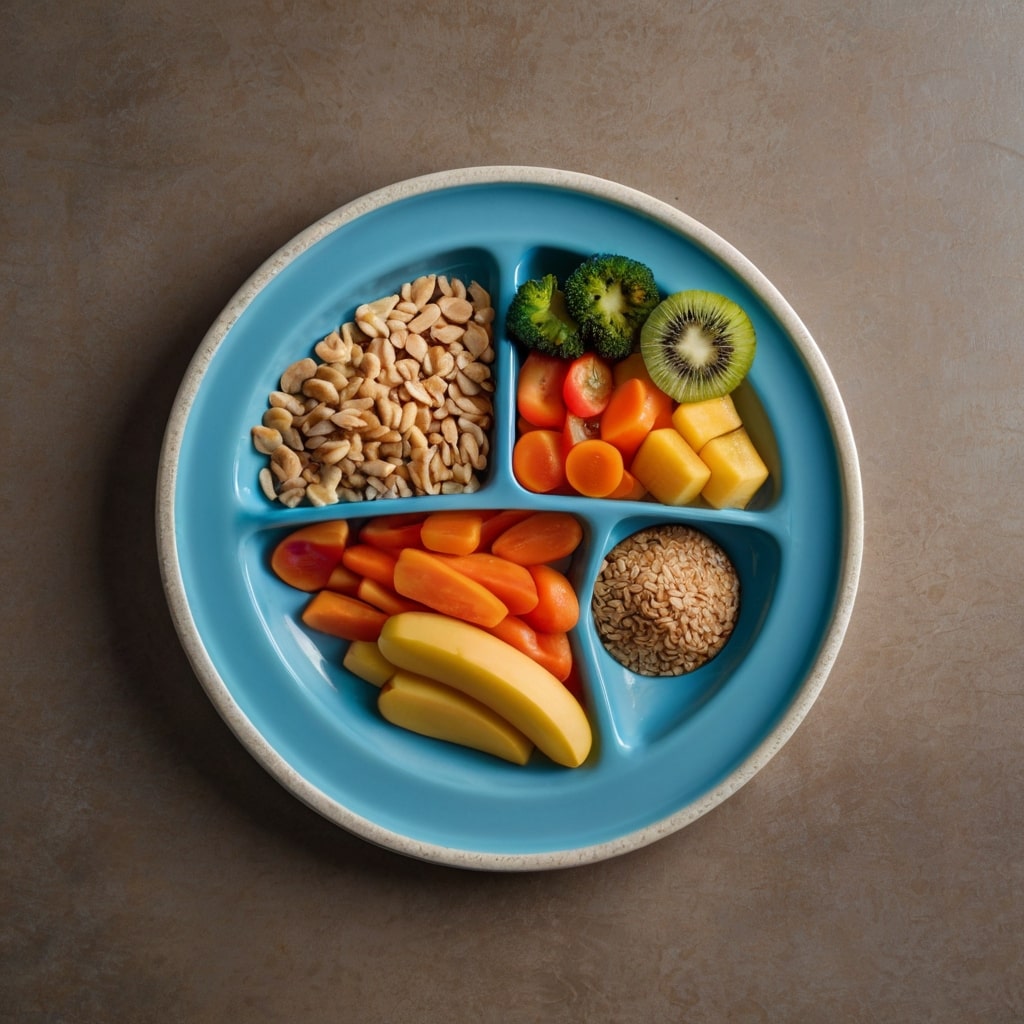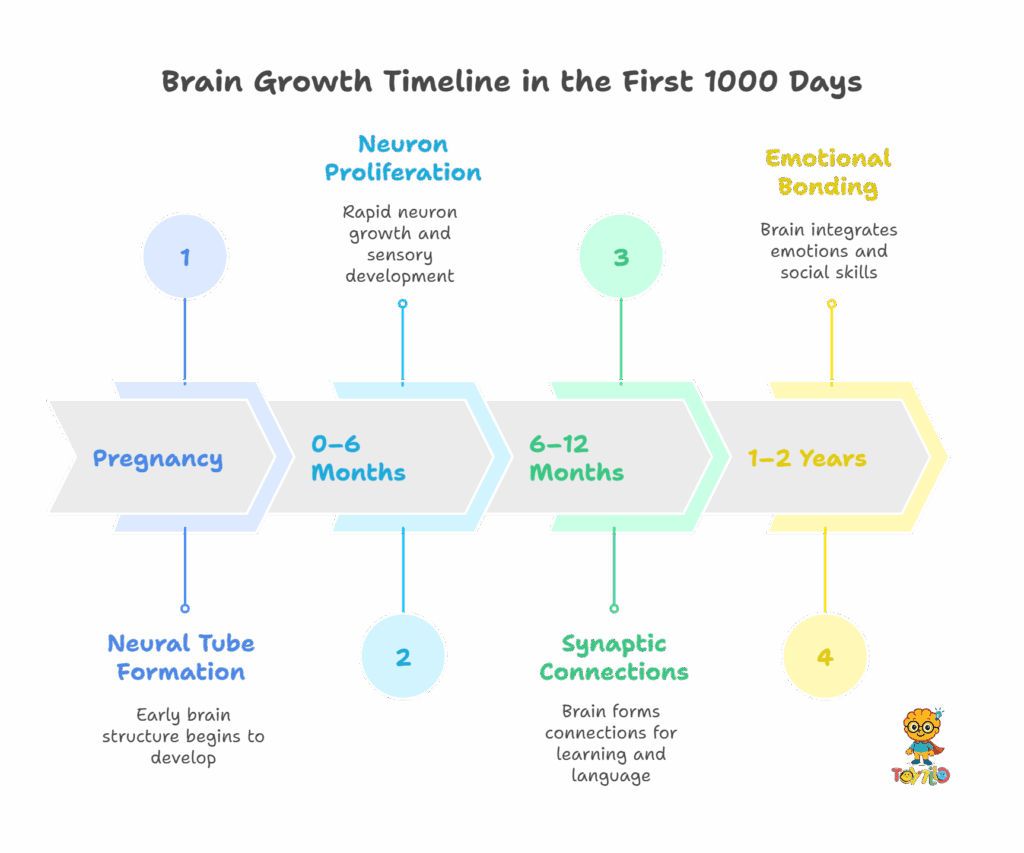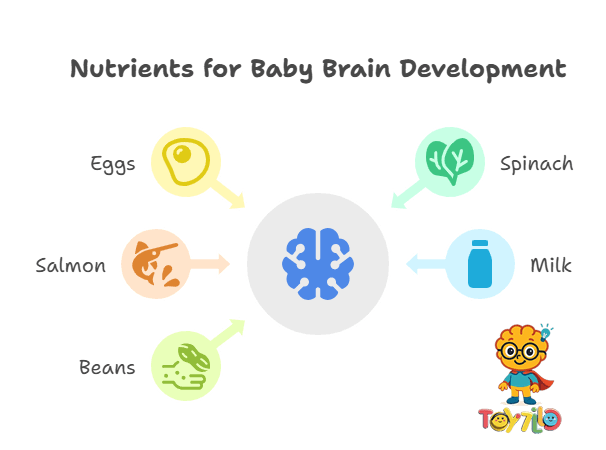🧠 Why the First 1000 Days Matter So Much
The first 1000 days—from conception to a child’s second birthday—are a once-in-a-lifetime window for brain development. During this phase:
-
Over 1 million neural connections are formed every second.
-
80% of a child’s brain growth is complete by age 3.
-
Nutrition plays a vital role in cognitive, emotional, and motor development.
According to WHO and UNICEF, proper nutrition during this period determines the child’s future learning ability, behavior, and health outcomes.
🥦 Essential Nutrients That Feed Baby’s Brain
Here are the key nutrients that science links to cognitive and neural development:
1. DHA (Docosahexaenoic Acid)
-
An Omega-3 fatty acid vital for brain cell structure and visual development.
-
Sources: Fatty fish (salmon, sardines), DHA-fortified eggs, breast milk, and formulas enriched with DHA.
2. Choline
-
Supports memory and brain cell communication.
-
Sources: Eggs (especially yolks), meat, soybeans, and breast milk.
3. Iron
-
Helps oxygen flow to the brain. Iron deficiency in infancy is linked to lower IQ.
-
Sources: Red meat, lentils, spinach, iron-fortified cereals, and breast milk.
4. Zinc
-
Supports brain structure and cognitive function.
-
Sources: Meat, beans, nuts, dairy, and whole grains.
5. Iodine
-
Vital for thyroid hormones, which regulate brain development.
-
Sources: Iodized salt, dairy, eggs, and seafood.
6. Protein
-
Builds brain tissue and supports neurotransmitter activity.
-
Sources: Eggs, lean meats, fish, legumes, and tofu.
7. Vitamin D
-
Supports brain signaling and bone development.
-
Sources: Sunlight, fortified dairy, and supplements as prescribed.
8. Folate (Vitamin B9)
-
Prevents neural tube defects during pregnancy and supports DNA synthesis.
-
Sources: Leafy greens, citrus fruits, beans, and fortified cereals.
🍽️ Best Brain-Boosting Foods for Every Stage
👶 Pregnancy
Nourishing your baby’s brain starts before birth.
-
Eat: Leafy greens, citrus fruits, salmon, whole grains, eggs.
-
Avoid: High-mercury fish, undercooked meats, and processed junk.
👶 0–6 Months
-
Breastfeeding is the gold standard—rich in DHA, choline, and antibodies.
-
If formula feeding, ensure it’s iron- and DHA-fortified.
🖼️ Image Prompt: A mother breastfeeding with a brain outline overlay showing DHA pathways.
👶 6–12 Months
This is the ideal time to introduce solid foods:
-
Mashed eggs
-
Iron-fortified cereal
-
Pureed lentils and spinach
-
Mashed avocado (rich in healthy fats)
👶 1–3 Years
As your baby grows, continue variety:
-
Nut butters (no chunks)
-
Cooked leafy greens
-
Cheese, yogurt, and full-fat milk
-
Soft fish like salmon
👩🍳 Smart Tips for Feeding Brain-Boosting Nutrition
-
✅ Start with single-ingredient foods to monitor allergies.
-
✅ Follow the rainbow rule: offer colorful fruits and vegetables.
-
✅ Avoid added sugar and salt, which can hinder brain development.
-
✅ Introduce textures slowly to encourage chewing and motor skill growth.
-
✅ Cook at home when possible to avoid preservatives.
❓ Common Questions Parents Ask
Q: What if my baby doesn’t like certain healthy foods?
That’s normal! Keep offering them in different ways—pureed, mashed, mixed with fruit, or finger food style.
Q: Can picky eating affect brain development?
If the diet is lacking in essential nutrients like iron, DHA, or choline over time, yes. Work with a pediatric nutritionist to create variety.
Q: Are supplements needed?
Only if recommended by your pediatrician. Most babies get what they need from breast milk, formula, and a varied diet.
🧠 Brain Food Meal Plan: Sample Day (1–2 Years)
| Meal | Food | Nutrients |
|---|---|---|
| Breakfast | Scrambled egg + avocado | Choline, DHA, healthy fats |
| Snack | Banana + full-fat yogurt | Potassium, protein |
| Lunch | Mashed lentils + spinach + rice | Iron, folate, zinc |
| Snack | Nut butter on toast (thin) | Protein, zinc, healthy fats |
| Dinner | Baked salmon + sweet potato | DHA, vitamin A |
💡 Final Thoughts
Feeding your baby for brain development isn’t just about giving food—it’s about nourishing the future. The first 1000 days are your best opportunity to lay the foundation for learning, memory, and emotional intelligence. Focus on whole foods, rich nutrients, and a balanced approach—and your baby’s brain will thank you for a lifetime.






